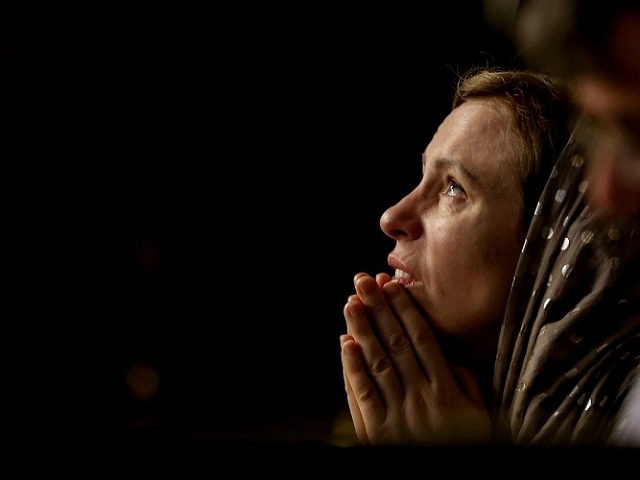A report published this week by the Turkish Association of Protestant Churches warns that persecution and hate speech against Christians of all denominations increased significantly throughout the country in the last year, particularly in the media.
The Turkish newspaper Hurriyet highlights the release of the new report, the 2016 Rights Violations Report, and notes that hate speech against Christians in public has increased and particularly reached extreme levels during the Christmas season. The report, Hurriyet relays, cites “billboard advertisements, posters, leaflets, and online” as forums for anti-Christmas and anti-New Year’s celebrations. The government appeared to do little to prevent open displays of anti-Christian bigotry.
In addition to open antagonism towards Christianity in public, the Association of Protestant Churches cited numerous cases of institutional discrimination against Christians in schools. The report cataloged cases of both Christian and Jewish students being forced to recite the Shahada, or Islamic profession of faith, and attend Islamic schooling despite being registered as non-Muslims.
“The use of the exemption right [from religion classes] is becoming more difficult day by day,” the report read, noting that officials were requesting more documents and more evidence to excuse a child from Quranic classes to discourage parents from keeping the children out of these curricula.
The outlet Turkish Minute translated another part of the report which objected to media reports referring to Bibles as “terrorist material” when found in the homes of suspects, among them individuals arrested for reportedly participating in the July 15, 2016, failed coup.
The content of the 2016 report appears to differ somewhat from its predecessor. In early 2016, the Association of Protestant Churches released its 2015 report, in which it cited the government’s refusal to allow construction of new places of worship for Christians among the biggest challenges facing religious leaders.
The report did, however, protest “hate crimes, physical and verbal assaults as well as threats against Protestant Christians” and noted multiple instances of Christian children being forced to recite the Shahada in school
Turkish Islamist nationalists have used the Christmas and New Year holidays to object to the observance of Christian holidays for years. In December 2015, for example, Islamists protested a Christmas tree in Ankara they objected was located too close to a mosque. “We are the Ummah of the Prophet Muhammad who brought prayer from his ascent to heaven, not of Santa Claus who brings presents for the New Year,” read one of the signs the protesters carried.
The 2016 Christmas season featured more outrageous demonstrations against Christianity. The Islamist nationalist group Alperen Hearths staged a forced conversion of Santa Claus to Islam in western Aydin province, putting a gun to the head of an actor portraying Santa Claus.
“Our purpose is for people to go back to their roots. We are the Muslim Turkish people who have been leading Islam for thousands of years. We will not celebrate Christian traditions and disregard our own traditions like Hıdrellez, Nevruz and other religious and national holidays,” a representative of the group said.
Santa Claus is a personality modeled after Saint Nicholas, a native Turkish Catholic saint.
The Islamic State has also established itself as a violent anti-Christian presence in Turkey. On New Year’s Eve, an Islamic State jihadist attacked Istanbul’s Reina nightclub, which the group alleged was a statement against the celebration of the new year on the Gregorian calendar. Muslim extremists consider New Year’s Eve a pagan and Christian celebration exclusively. Most of those killed in the nightclub attack were Middle Eastern tourists.
In addition to terrorist threats, the government has made moves against the Christian community. In December, for example, pastor Andrew Brunson, an American member of the Evangelical Church of the Resurrection in Izmir, was arrested for allegedly being involved in the failed coup against Islamist President Recep Tayyip Erdogan. Erdogan blames the coup on Fethullah Gulen, an Islamic cleric living in Pennsylvania, who has denied any involvement. Brunson’s attorney has argued that his arrest is a result of Christian persecution, and at least one prominent Turkish statesman, Aykan Erdemir, agrees: “Turkish President Erdogan sees anti-Christian conspiracy theories as an effective strategy for galvanizing popular support for his one-man rule.”
Protestants are not alone among Christians in being targeted by Muslim bigots.
“Although we can move around freely, people are understandably afraid of coming to Mass, and there’s been a drop in participation,” Bishop Ruben Tierrablanca Gonzalez of Istanbul told the Catholic Herald in January. Bishop Gonzalez discouraged any “political statement” in favor of Christians, however: “It’s a difficult moment, and all we can really do is speak out together against terror and in favour of peace; this, rather than any political statement, has to be our message to the Turkish authorities.”
Erdogan’s Justice and Development Party (AKP), while economically liberal, is widely considered an Islamist party friendly to “civilizational jihadi” outfits like the Muslim Brotherhood. Erdogan himself hosted an “Islamic unity” conference in Turkey in April 2016 and issued directives to Muslims to procreate rapidly to expand the scope of Islam globally. Erdogan has also repeatedly made the debunked claim that Muslims colonized America before Christopher Columbus’s arrival in 1492, in attempts to convince the Communist government of Cuba to build more mosques.
AKP members in Parliament have called for overthrowing Turkey’s secularist government and replacing its Constitution with an Islamist charter.

COMMENTS
Please let us know if you're having issues with commenting.